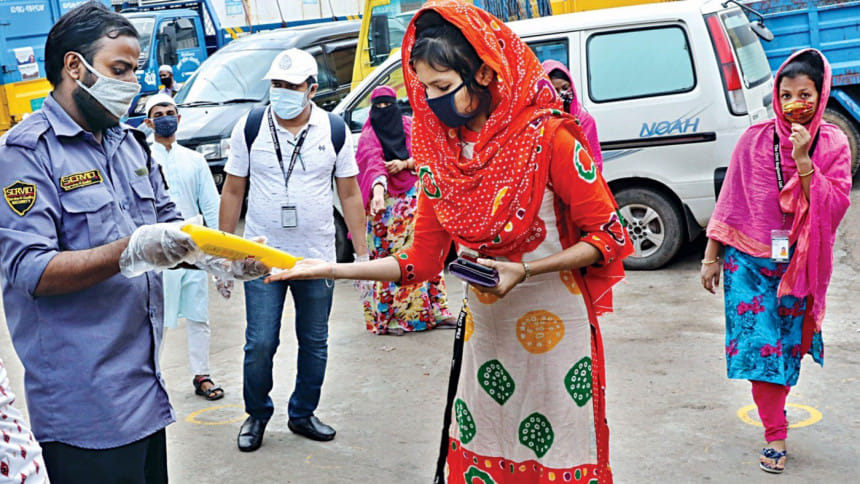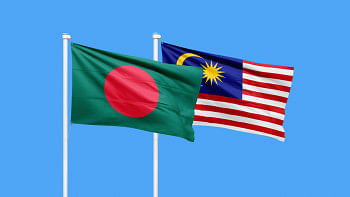What effect will lockdown have on the apparel industry?

The Bangladesh government is set to enforce a week-long hard lockdown across the country, beginning April 14. Many murmurs it may go beyond that as well. While I understand "why" the government feels compelled to act that way, I believe we need to rethink the strategy and find some creative ways taking into account the economy of the country, especially its apparel industry, which is intricately linked to global chains, and is already at a fragile state and passing through a critical moment in its recovery.
A better way ought to be pondered which would protect our people as well as their livelihoods. I believe "Lockdown Lite"—which has been practised in many other countries—could be more apt for Bangladesh and its needs and circumstances. I am no expert in pandemics or public health, nor do I claim to know more than our esteemed health professionals. Yet, I may submit that the policymakers behind the decision for a heavy lockdown need to consider several other factors.
The first is the safety of the garment factories. The RMG industry in Bangladesh has gone to extraordinary lengths to create safe working environments since this pandemic erupted last year: workers constantly wash hands, wear masks, follow strict hygiene protocols and stay six feet apart.
Medical assistance and doctors are always available. Staff are constantly educated on how to stay safe. Workers are also encouraged to share the good practices they learn at work as they return to their homes. Temperatures of workers are recorded twice a day in factories. Anybody with symptoms is immediately tested and isolated, when necessary.
These strict protocols have been vital in ensuring that outbreaks of coronavirus in the workplace have been rare in the past year. Numbers over the past 13 months surely vindicate that.
In many ways, the workplace now provides the safest environment for garment workers, not least because many of these workers live in cramped housing spaces where there are often six or more people in a tiny environment. Are they being tested while they are at home? It's unlikely. Do they stick to strict protocols? Again, we simply cannot know, although we can safely assume that not all will follow the kind of stringent hygiene norms at home as they do while at work.
When they are at home, workers may be carrying the virus but remain asymptomatic. Lulled into a false sense of security, they can spread the virus in their surroundings without knowing.
There is another issue at play here. If we lockdown from April 14, it is likely that many workers will not remain in Dhaka and will instead return to their villages. Speculations could kick in, as did last March-April. Our villages, which up until now have remained relatively Covid-free, now risk becoming infected—thus increasing community spread. Indeed, the nation does not want that. Surely, the workers are relatively safer to be at work where they can be monitored, tested and isolated, if needed.
I believe that a hard lockdown is likely to have unintended consequences by increasing the spread of the virus, rather than dampening it down. Let me outline "lockdown lite" which, to many, should offer a more considered approach.
Don't get me wrong, I am not pitching "business" ahead of life. Under the present circumstances, it is a fact that if we want a successful, world-class healthcare system, we also do need a flourishing economy.
As it stands this week, many of our key markets are set to re-open fashion stores, the UK being a key one. All analysts suggest there will be a surge in buying as markets reopen and pent-up demand is unleashed.
If we do not fulfil this demand, our competitors will. And, if the orders move away once, it may well do for a good long time. This is something we cannot ignore. For instance, lockdowns have not stopped factories from opening in Cambodia. Instead, the Cambodian government has managed the situation creatively, i.e. implementing curfews and restricting inter-city travel. Can't we do something similar?
If we must lockdown, going for "lockdown lite" has the benefit of being more easily sustained over a longer period.
Morocco and Turkey are also taking a similar approach, e.g. closing certain shops at particular times, restricting movement and encouraging good levels of personal hygiene. Common sense, basically.
During the last heavy lockdown or "general holiday", as the government called it, many factories were prevented from completing critical orders. This has happened time and again these past 12 months, destroying confidence with customers—many of whom may never return if they start to believe that Bangladesh is in a perpetual state of closing down and opening up without a sustainable solution. This would render untold damage to our reputation as a garment hub.
Currently, all the factories are in a rush for completing shipments before Eid. If a lockdown is imposed, the factories would not surely complete these shipments. With schools and economic activities likely resuming in the western world from this August, buyers will also not be ready to agree to take the orders on a later date. Clearly, the repercussions of wholesale lockdown in the apparel industry will be far too heavy for the factories, in particular, and for our national economy, in general, to absorb.
The timing of the hard lockdown is also critical—it coincides with the celebration of the Bengali New Year holiday as well as the start of Ramadan. There is a risk that many workers will assume the hard lockdown will be extended, when in all likelihood they head to their hometowns, until after Eid. Thus, this could cause a new wave of the virus. And, Eid is another factor to consider: are we then still expected to pay Eid bonuses while factories stay closed?
This is in no way a criticism of our government. Our prime minister is providing stellar, prudent leadership, and the government is discharging a job which is virtually impossible under extremely trying circumstances. Governments everywhere have been learning on the job about handling this pandemic.
Surely, it does not have to be a black-and-white situation in terms of hard lockdown versus normal life. Possibly a third way should merit thinking in which we take advantage of our investments, time and effort that RMG factories have put in to ensure the workplace is as safe a place as any in the current environment. However, the importance of stricter monitoring of the safety measures in each and every factory by the government as well as by Bangladesh Garment Manufacturers and Exporters Association (BGMEA) cannot be overstated to contain and control the infection rate.
By all means, let us introduce curfews and enforce strictest movement restrictions on the private lives of individuals—these are sacrifices we are all happy to make for the collective, national good.
In the meantime, let's please keep the wheels of our proud RMG industry turning—so that as we emerge out of this pandemic, we are ready to robustly hit the ground running.
Mostafiz Uddin is the Managing Director of Denim Expert Limited. He is also the Founder and CEO of Bangladesh Apparel Exchange (BAE).

 For all latest news, follow The Daily Star's Google News channel.
For all latest news, follow The Daily Star's Google News channel. 



Comments